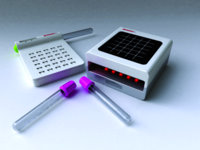Oct 23 2007
In a world first, Victorian nanotechnology venture Quintain NS has announced a rapid meningococcal diagnostic test. The test will ultimately allow detection of meningococcal disease in less than fifteen minutes compared to the current tests, which can take up to 48 hours.
 Quintain NS meningococcal test
Quintain NS meningococcal test
An announcement regarding the filing of a worldwide patent has been made at the AusBiotech national conference in Brisbane.
Meningococcal disease affects 700 people in Australia each year. The morbidity rate for those infected with meningococcal disease is 10 per cent, with death often occurring within 12 hours. Around 20 per cent of those affected will have permanent disabilities. The incidence of death and disability resulting from meningococcal disease may be significantly reduced by rapid diagnosis, which would enable antibiotic treatment to be administered at an earlier stage of disease progression.
The currently available tests take between 2 and 48 hours, and often involve culturing either blood or cerebrospinal fluid to detect the presence of meningococcal bacteria.
The new test has been developed by Quintain NanoSystems (Quintain NS), a vehicle established from Nanotechnology Victoria, a Victorian State Government initiative to assist in the commercialization of nanotechnology research.
Nanotechnology exploits phenomena characteristic of materials at a scale of one billionth of a meter. Nanotechnology is likely to revolutionize the medical diagnostics and therapeutics industries over coming decades.
The Quintain NS meningococcal test is based on nanoparticle and nanocluster technology developed at RMIT University , one of Australia’s leading bioengineering centres. Nanoparticles of gold are covered with antibodies that attract a protein present on the surface of meningococcal bacteria. In the presence of the meningogoccal bacteria, the gold particles ‘cluster’ together. This causes an immediate colour change, providing a simple means of detection for the disease.
Dr Jeanette Pritchard, who is leading the diagnostics and imaging activities for Quintain NS, says: “The completion of this patent is an important milestone. The RMIT team has developed a suite of outstanding technologies, with the potential to address many diseases; meningococcal is the first. Filing of provisional patents will protect the Australian invention and we expect that the meningococcal test will be available within 2-3 years.”
Dr Anna Lavelle, CEO of AusBiotech, said that the launch of the technology at the AusBiotech Conference in Brisbane will bring it to international attention. “We have some very senior people from the world’s biggest pharmaceutical companies coming to Brisbane to see just what Australia has to offer – and Quintain’s invention is just what we excel at – clever technology that is world class,” she said.
Dr Peter Binks, CEO of Nanotechnology Victoria, attributed the success to the development team: “This is a great achievement, and tremendous credit should go to the team at RMIT University – Professor David Mainwaring, Dr John Fecondo, and Eddie Grixti – and the NanoVic team – Dr Jeanette Pritchard, Dr Michelle Critchley, and Dr Bob Irving. The combination of superior research from RMIT and commercial orientation from the Quintain team has accelerated the development of a product of real importance to the community”.
A prototype device for meningococcal diagnosis is under development.Quintain has combined with leading Melbourne Design house Charlwood to produce a set of novel devices, making the test safe and easy to perform. The devices will be completed by the end of November.